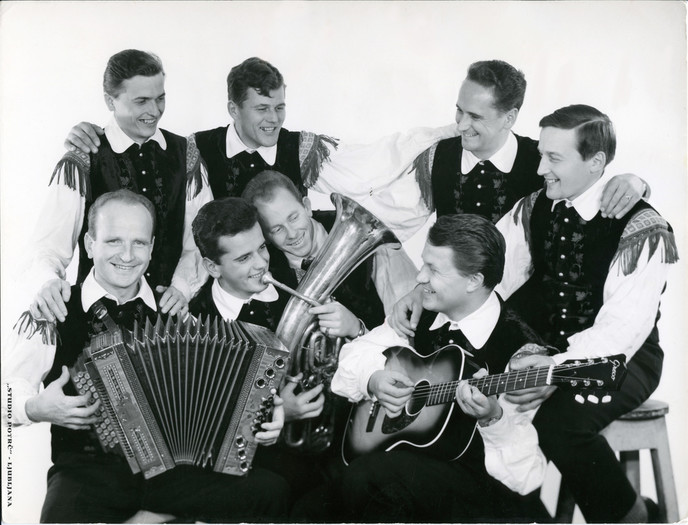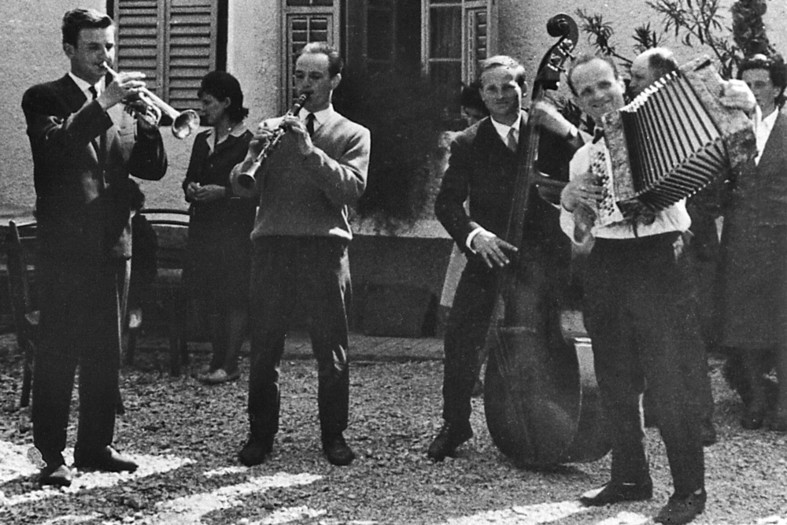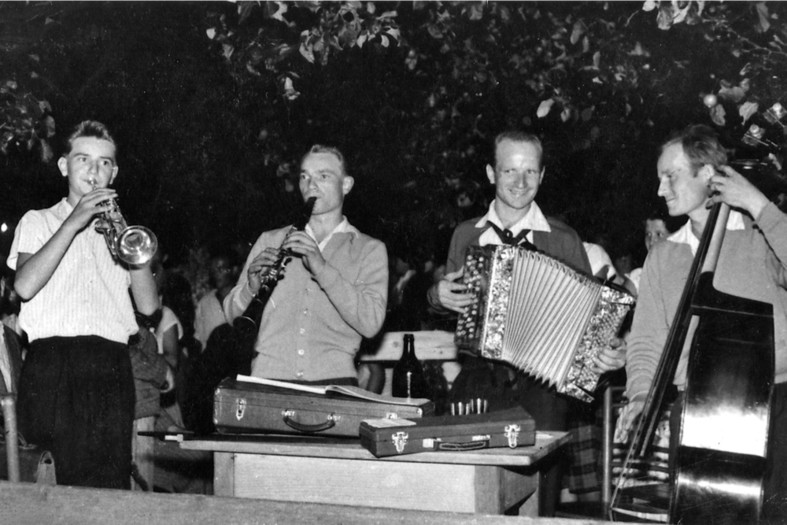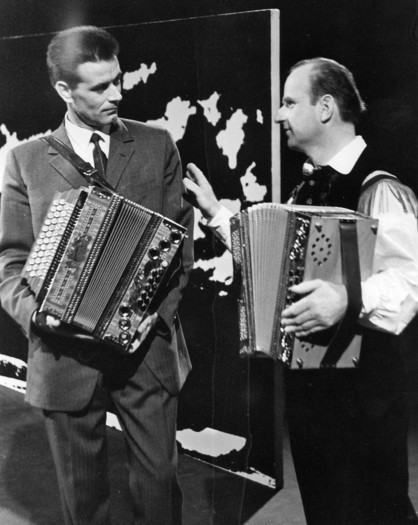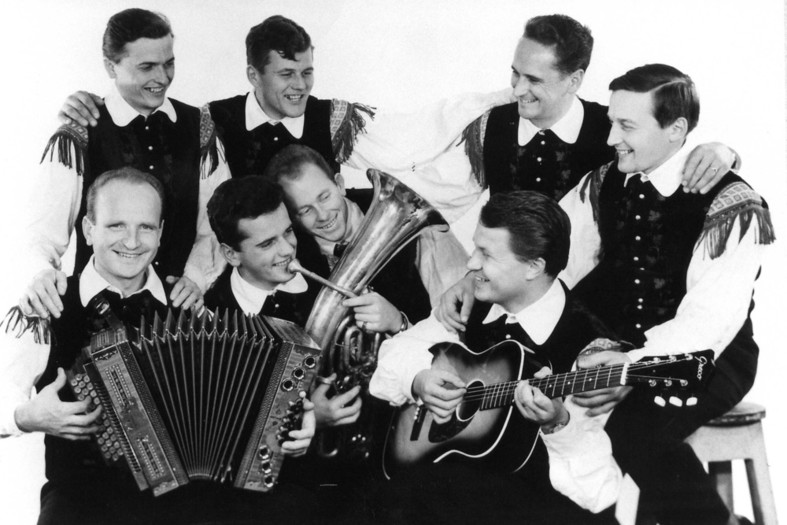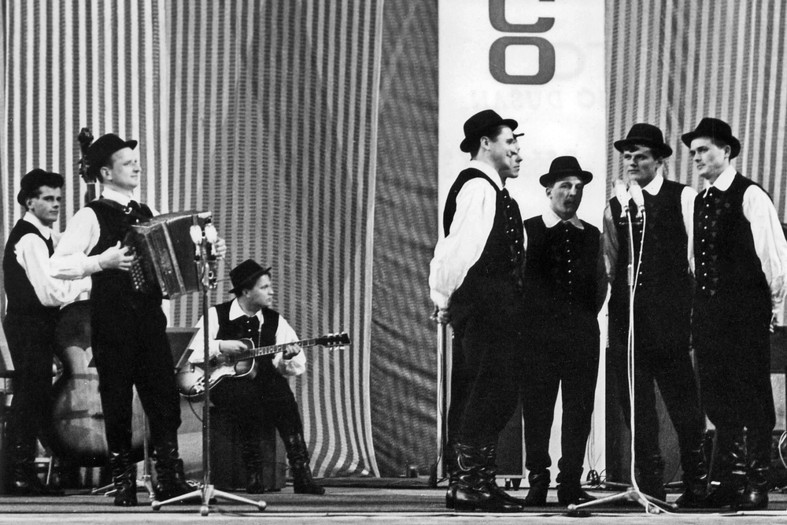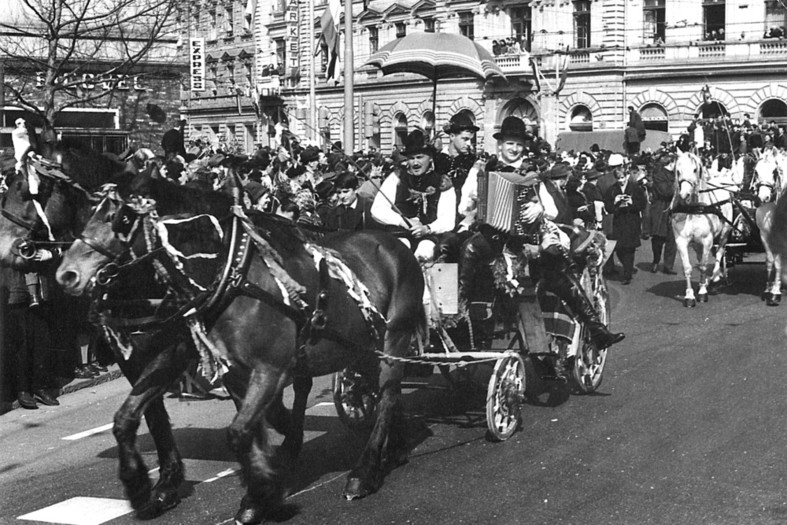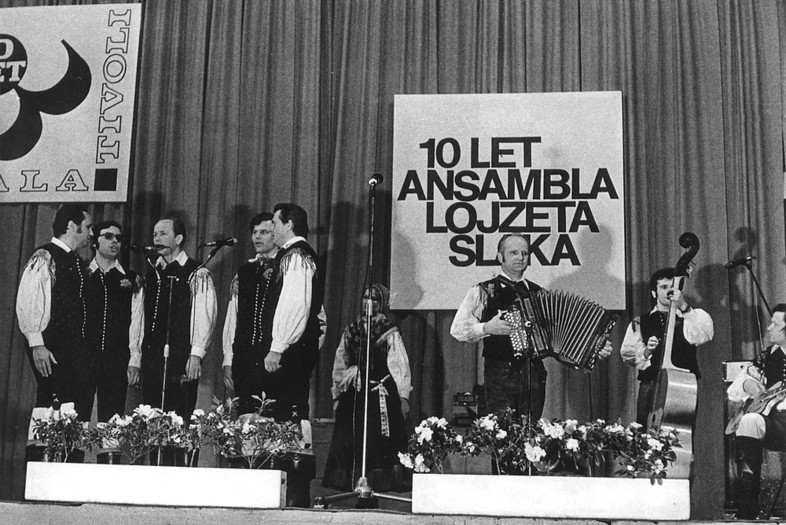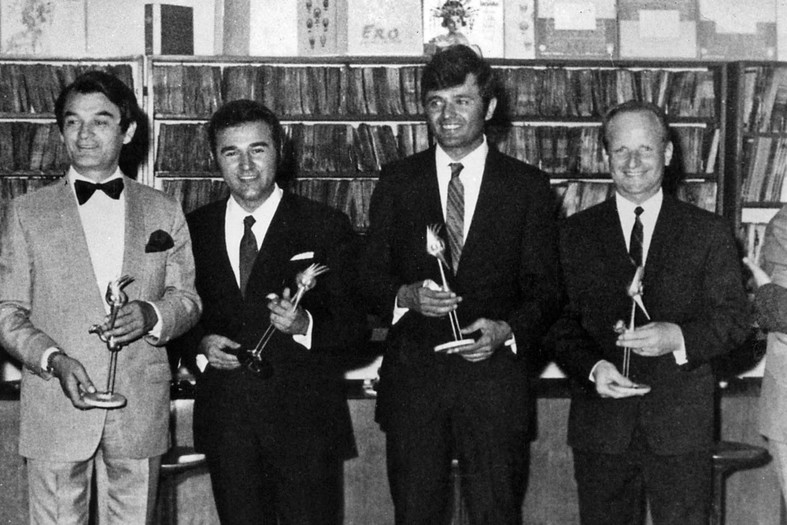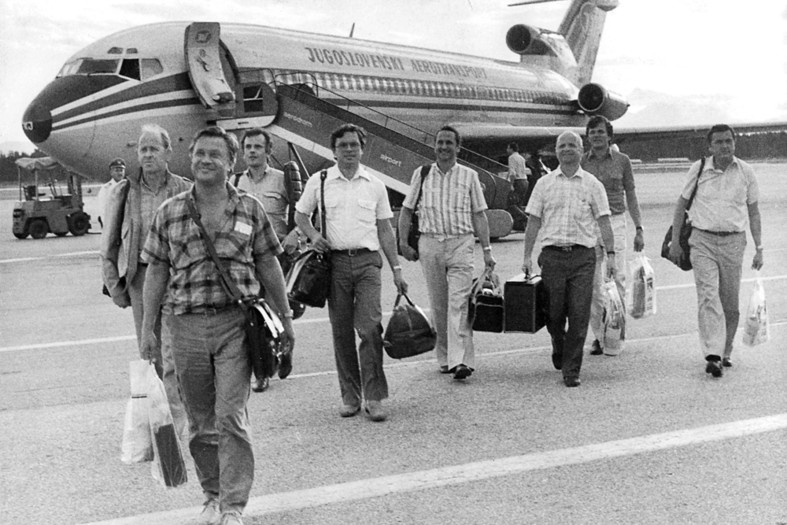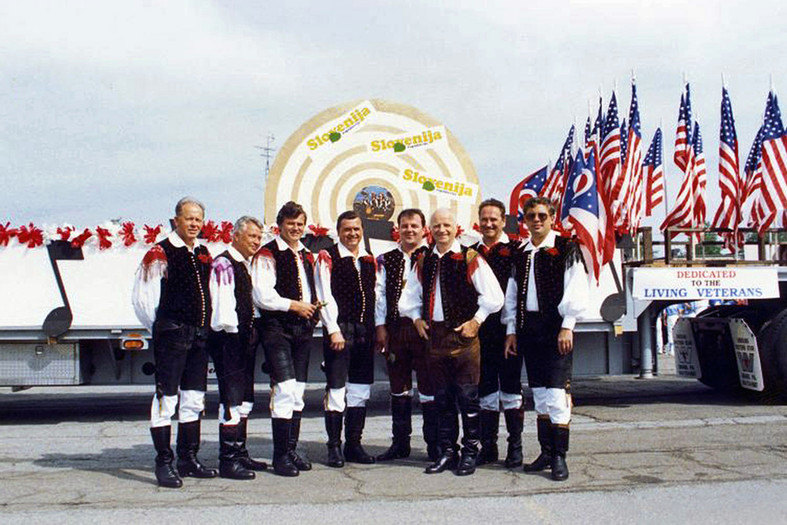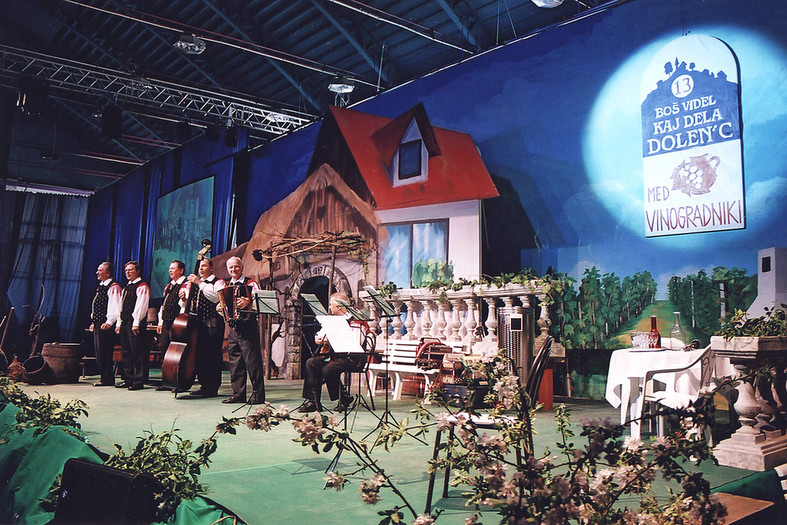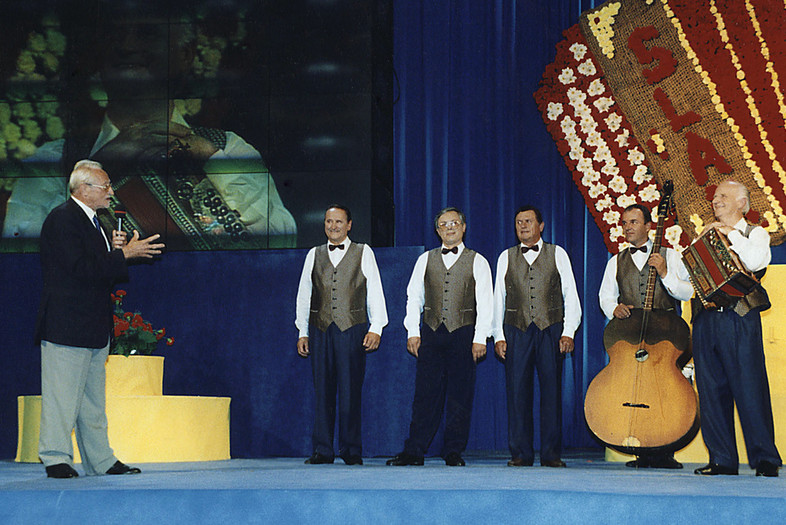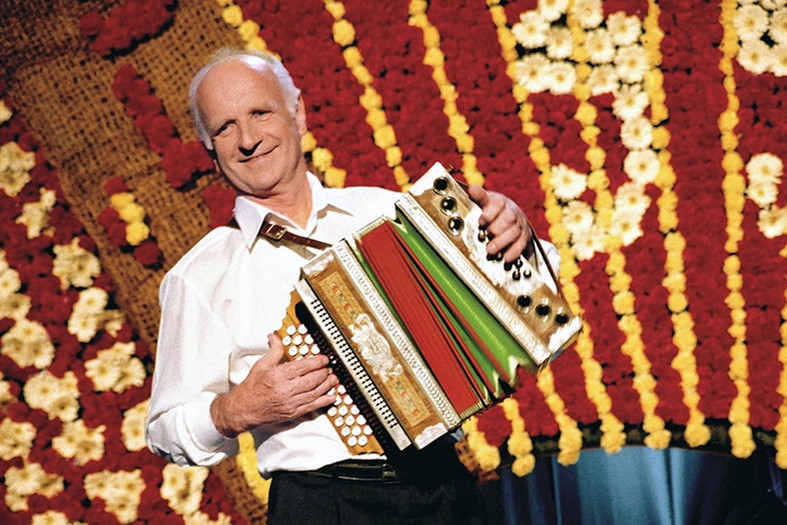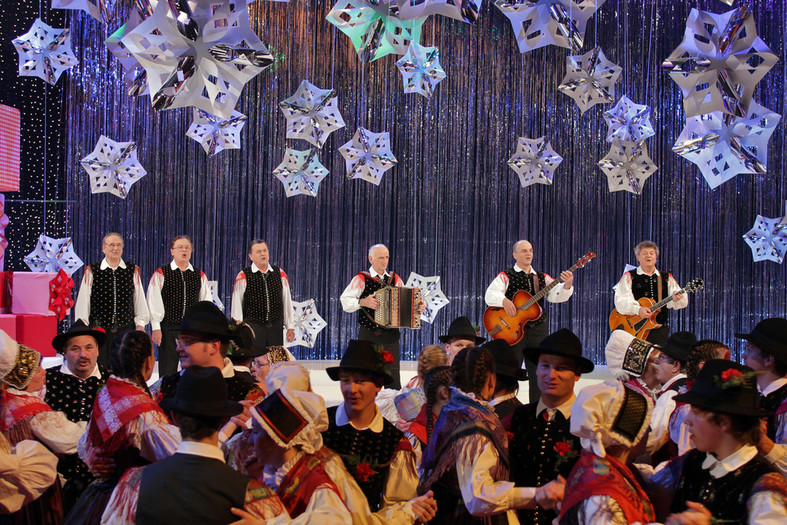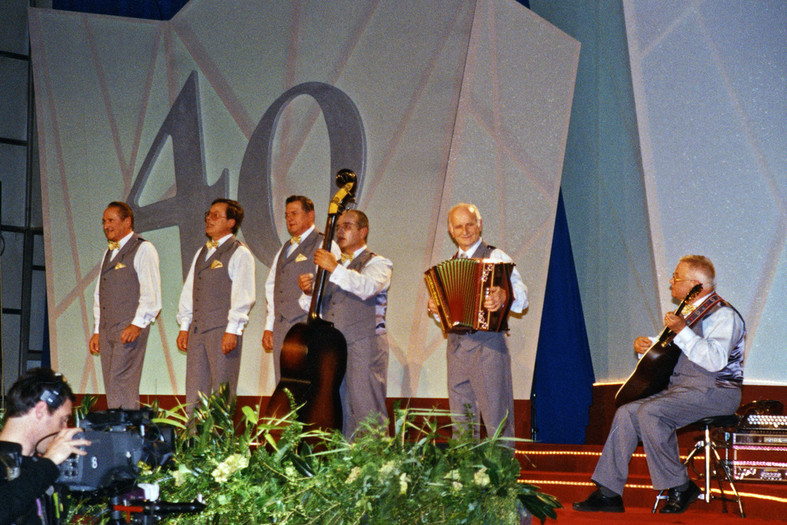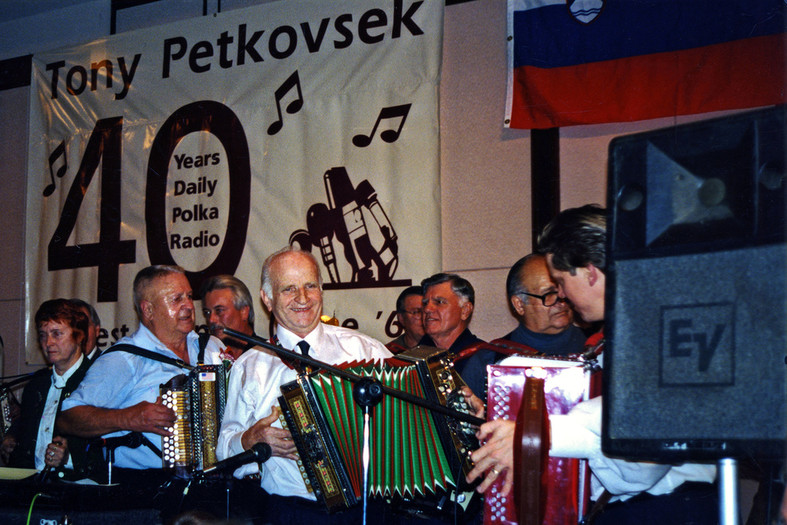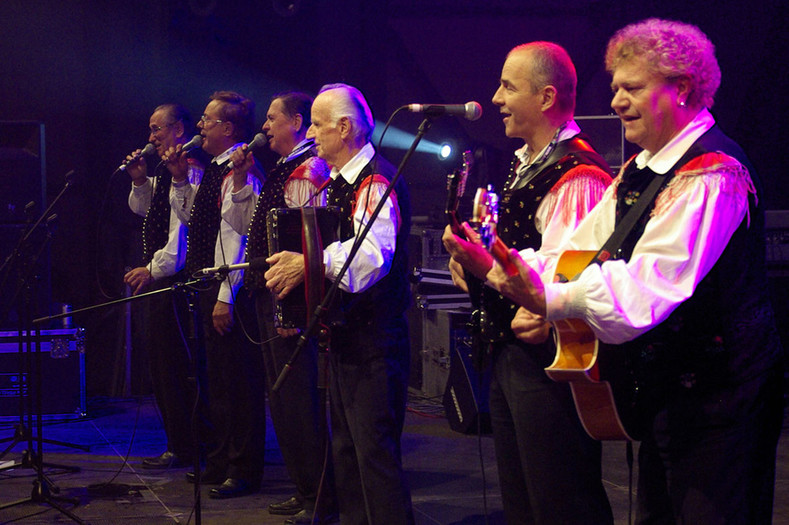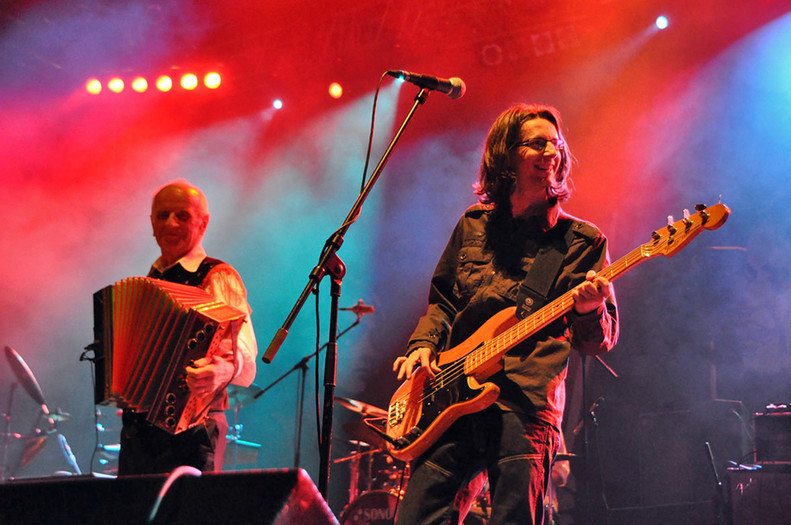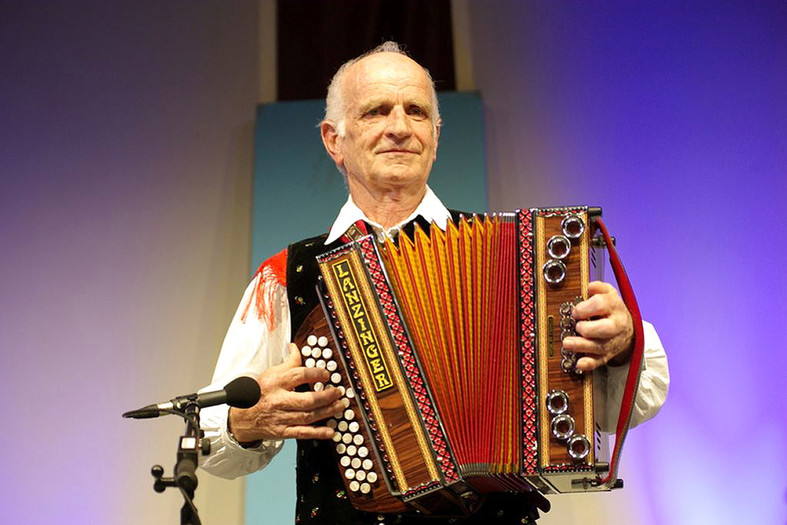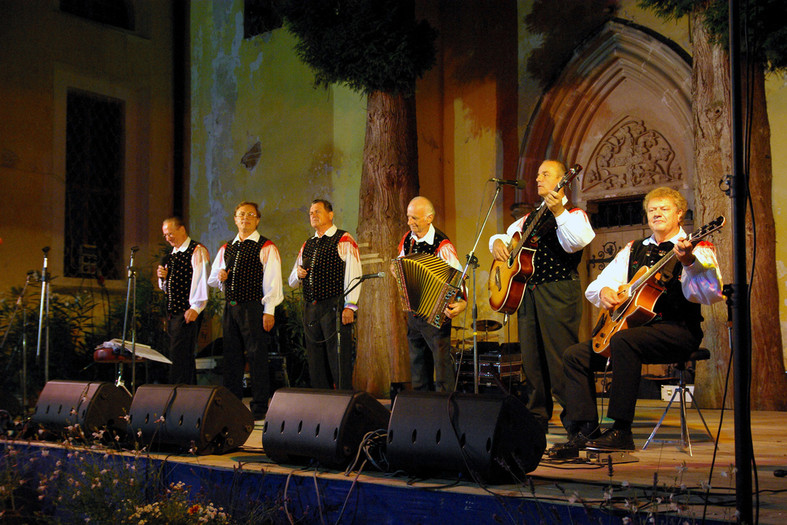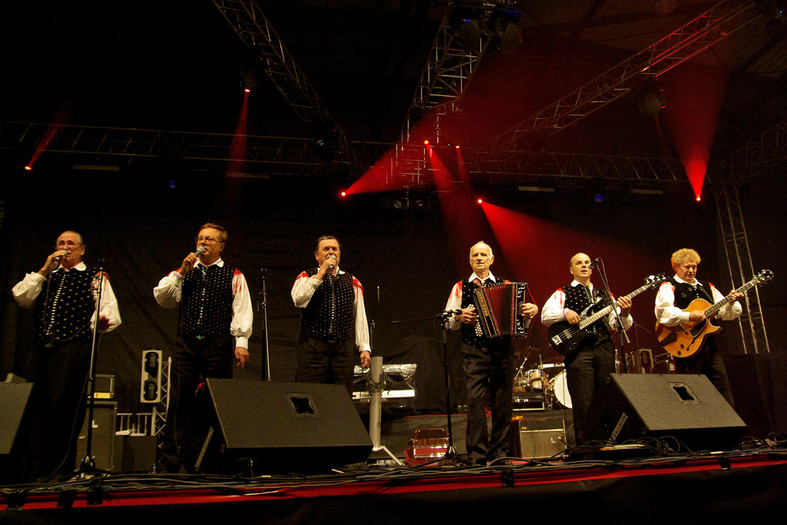LOJZE SLAK'S MUSICAL PATH
The year 1964 is usually recorded as the birthday of the ensemble of Lojze Slak, however the story of the ensemble began earlier, when a young man from Jordankal in Dolenjska with his accordion brought the whole hall to its feet. It was on on the public radio show Pokaži kaj znaš! (Show what you know!) where he won first place, and thus opened himself the door to a radio house and recording studios.
Listeners, music editors, they were all the ones who were convinced that he is an exceptional talent, a musician with the right attitude and a lot of energy. Of course, because his fondest memories were connected with playing, and the musical vein was in him, so to speak, from a young age. His uncle on his mother's side, Ludvik, aroused the young Lojzek's musical enthusiasm and joy in music, and thus probably outlined his destiny at an early age.
In Slak's family, a few other boys were in love with the local melodies, so Lojze soon formed an instrumental quartet together with his brothers Matija, Stane and Tone, whom the whole of Dolenjska met in a short time.
The happy boys, with their music that sounded warm and homely, performed at many events, weddings, and village festivities. However, when the army call arrived, the boys dispersed, Lojze moved to Ljubljana searching for work and the Slak Brothers Ensemble has stopped playing.
But Lojze did not give up. The desire for the ensemble was burning in him more and more ardently, and every time he took the accordion in his hands, he was firmly determined to play melodies that were boiling under his fingers. He and his friend Niko Zlobko, who jumped in on the Slak brothers band with a clarinet and guitar when the first brother had to go to the army, vowed not to give up until they found a third. Thus, they also acquired Ciril Babnik with an ancient Slovenian string instrument - berda and Lojze Slak's instrumental trio was conceived. When Ciril Babnik has left the ensemble after less than two years, he was replaced by Franc Sever in the trio.
Lojze, Niko and Franci were seriously started their work at the very beginning: they successfully performed at various meetings of the ensembles and thus won the competition at the Gorenjska Fair in Kranj. They also won the first prize in the review of the ensembles at the Ljubljana Exhibition and Convention Center, and the path to recording studios was getting closer every day.
Although the Slak Brothers Ensemble recorded its first compositions for the radio archive in the early 1960s and the Lojze Slak Trio had already recorded its first small record in early 1964, published by RTB, the meeting of the Lojze Slak Trio with the vocal quintet Fantje s Praprotna was in fact the real start of Lojze Slak Ensemble.
Singers from the Selška Valley - tenors Andrej Bergant and Jože Šifrar, baritone Janez Habjan and bassists Janez Kalan and Janez Dolenc - celebrated just like Lojze Slak Trio on one of the shows "Show what you know!". Shortly after the meeting in front of the microphones of the Ljubljana radio show, Lojze and the singers agreed to cooperate together and a new group was born, which, like the Avsenik Brothers Ensemble, wrote a new chapter in the history of Slovenian folk music.
SLAK BROTHERS ENSEMBLE (1959 - 1963)
In Slak's family, a few other boys were in love with the local music, so Lojze soon set up an instrumental quartet together with his brothers Matija, Stane and Tone. And the whole of Dolenjska knew them in a short time. Lojze Slak created, searched for and found a new vision of folk music in Slovenia. The diatonic accordion was first joined by clarinet, trumpet, berda and guitar, and then by three-part male singing. In 1959 he founded the Slak Brothers Ensemble. In the quartet, brother Tone played the trumpet, Matija the clarinet, Stane the bass and Lojze the accordion.
The Slak brothers played in such a band for more than three years. They performed at various events and festivities and recorded the first four songs for the radio archive: Mirnopeška polka, Pomlad na deželi, Svatje že vriskajo and Vijolice. Soon the two brothers Matija and Tone had to leave the band due to military service, and the ensemble ceased its activities.
Although the year 1964 was recorded as the birthday of the Lojze Slak Ensemble in the registry books, the real story of the ensemble began at the very day when a young man from Jordankal near Mirna peč in Dolenjska performed on the public radio show "Show What You Know". He won first place with his music performance and opened himself the doors to a radio house and recording studios.
LOJZE SLAK TRIO (1963 – 1964)
After two of his brothers had to left for military service, Lojze Slak continued his musical path with the establishment of the Lojze Slak Trio, in which he played the accordion, Niko Zlobko guitar and Ciril Babnik berda. In the 1964, they released Slak's first record on Radio Television Belgrade, entitled Domači vasici. The instrumental ensemble was a successful start to the ensemble, but Lojze missed the polyphonic male singing, which he also knew from his home village on Mali Kal.
THE BOYS FROM PRAPROTNO (1964)
However, the real beginning of Lojze Slak's ensemble, as it was loved by friends of local music, is marked by the meeting of Slak's instrumental trio with the vocal quintet Fantje s Praprotna. Singers from the Selška Valley - tenors Andrej Bergant and Jože Šifrar, baritone Janez Habjan and bassists Janez Kalan and Janez Dolenc - celebrated just like Slak's trio on one of the radio shows "Show what you know!". Shortly after their meeting on this Ljubljana radio show, Lojze and the singers agreed to cooperate with each other and a new group was born, which wrote a new chapter in the tradition of Slovenian folk music.
The Boys from Praprotno are a male singing group from Praprotno village in the Selška valley above Škofja Loka. Until 1963, they acted as a sextet, and after that year, five singers remained. In the first years of their operation, they sang in four voices, and after merging with the Lojze Slak Trio, first for a short time in three voices, and then until the end in four voices.
LOJZE SLAK ENSEMBLE (1964 – 2011)
The Lojze Slak Ensemble was formed by the merger of the Lojze Slak Trio and the singing group Fantje s Praprotna in 1964.
The sound of the diatonic accordion and polyphonic male singing enchanted Lojze Slak in his dewy youth. He wanted to form an ensemble that would combine the instrumental part of the ensemble, in which the diatonic accordion and polyphonic male singing would play a leading role. On the radio show Show What You Know in 1964, he first heard live singing of the group Fanyje s Praprotna, which he really liked. He invited them to participate and one of the most recognizable Slovenian national entertainment ensembles at home and among Slovenians abroad was formed. They performed together for 47 years.
Slak knew the lyrics of folk songs, which spoke about life in the village, folk customs, personal celebrations, farm chores, viticulture, the beauties of the Dolenjska region, personal problems and desires of people, etc. He wrote many arrangements of these songs for his ensemble and in this way he tore them from oblivion. The lyrics and melodies were close to the Slovenian people, so the listeners accepted them with great enthusiasm during the first broadcast on the radio. His music immediately found its way to the Slovenian people and remains popular among the people to these days.
Lojze, who had mastered his musical instrument, the diatonic accordion, felt that it did not give him enough opportunities for his musical expression, so he invented and added a special bass button, which became known as "Slak's button". In doing so, he made an important contribution to the development of the diatonic accordion and its popularity in the music world. Slak conquered the whole of Slovenia with the diatonic accordion and more and more imitators appeared, so that in 1971 more musicians with diatonic than piano accordions performed at the Ptuj Music Festival.
In the USA and Canada a real instrumental revolution took place after Slak's tour - namely diatonic accordions, also called the "Button Box", were sought after as a souvenir and as a musical instrument. Many new ensembles and even orchestras of the "Button Boxes" grew up like mushrooms after the rain. Fans of Slovenian polka and waltzes set up new ensembles and even orchestras with diatonic accordions, which played Slak's music in their own American way.
The musical path only led him uphill. In the homeland, Lojze Slak's ensemble became a notion of folk music, their songs were regularly on the program of all radio shows, especially loved by listeners of the most popular shows, such as: "Thursday evening" and "Music of your wishes". Slovenians around the world also adored Lojze Slak and regularly invited him to his tours the USA, Canada and Australia. He became especially popular in the USA, where he received many music awards and he has even conquered the capital of country music - Nashwille.
10th ANNIVERSARY OF THE LOJZE SLAK ENSEMBLE (1974)
That year was the saddest in the history of Slak's ensemble: Jože Šifrar, tenor of the vocal quintet the Boys from Praprotno, died in a car accident. The ensemble dedicated to a dear friend an LP record entitled with: Glas njegov v spomin. Jože's place in the ensemble was taken over by Franci Rebernik from Jesenice.
At the jubilee concert on the occasion of the 10th anniversary, Slak ensemble presented themselves with new songs. They have received a golden record from the Helidon publishing house for the 100,000 large records (LP) sold and a special golden record from the Jugoton publishing house for the 350,000 large records (LP) sold, as well as many other awards. The concert had to be played twice in the same day, as the Tivoli Hall was sold out both times.
The Lojze Slak Ensemble successfully ended the jubilee year with a series of performances in their hometowns. They have also played in numerous charity performances to help many organizations and societies. The ensemble has so far listed over a thousand live performances at concerts or social events. According to the listeners' vote, they won the Crown of popularity award on the Stop magazine's popularity scale, and the ZKP RTV Ljubljana publishing house awarded the ensemble with a golden cassette the same year.
With a new music album, the Lojze Slak Ensemble, as the first Slovenian folk music ensemble under the auspices of the Slovenian Emigrant Society, set off on a two-month tour among compatriots in Australia on February 16, 1974. Among other places, the ensemble performed in Melbourne at the Moomba Festival in front of a crowd of 100,000.
In November, they went on a new tour to Western Europe where they performed for Slovenian emigrants in France, Belgium, the Netherlands, West Germany and Switzerland.
20th ANNIVERSARY OF THE LOJZE SLAK ENSEMBLE (1984)
The Lojze Slak Ensemble has marked their 20th anniversary with the twice-sold-out Tivoli Hall. They have earned numerous awards and recognitions, including two gold plates. Until then, the ensemble has received a total of fourteen gold records from Helidon and Jugoton music publishing companies. They have also recorded a television short movie celebrating the 20th anniversary of the Lojze Slak Ensemble.
The ensemble toured into the United States and Canada for the fourth time. During the five-week tour, they performed at as many as 35 events. In 1986 at the Tabor hall in Maribor, the Helidon music publishing company awarded them the thirteenth gold plate, and as to the first music group in Slovenia also a platinium plate for one million records sold.
In the 1989 they released the last LP (long play vinyl) record entitled Raj pod Triglavom (Paradise under Triglav) and a videotape of 25 years of the Lojze Slak Ensemble. In 1990, they embarked on the most high-profile tour of the United States and Canada, performing in Nashville, Disneyland, Florida and Caribbean. They had more than 30 performances in five weeks. A part of all the events was also recorded by the Ljubljana television team with its editor Boris Kopitar and prepared two shows for the Videomeh TV series.
30th ANNIVERSARY OF THE LOJZE SLAK ENSEMBLE (1994)
Before the jubilee concert at Cankarjev dom in Ljubljana (on June 4th, 1994), the Lojze Slak's group went on a short tour to Germany and Sweden. The celebration of the 30th anniversary of the Lojze Slak Ensemble took place for the first time in Cankarjev dom in Ljubljana, whose largest Gallus hall was sold out twice.
At the Golden Rooster music event, they received even three awards of Golden Roosters for their song Čebelar (The Beekeeper). They again staged two concerts in Novo mesto called: "Boš videl, kaj dela Dolen'c!" (You Will See What Dolen’c is doing) with the thematic titles Jožefovo and Božični večer (Joseph's Day and Christmas Eve). The Christmas Eve show received the award for the best thematic show at the music show competition in Switzerland.
The ensemble marked its long-term operation with a double CD and a video tape entitled 30 diamantnih (30 Diamond Songs), which immediately became a bestseller. The Helidon music publishing house awarded Lojze Slak Ensemble with a diamond record for 3 million records sold! Lojze Slak was also crowned with the flattering title "King of the Polka", and for his songs he also received the music award diamantni slavček (Diamond Nightingale).
40th ANNIVERSARY OF THE LOJZE SLAK ENSEMBLE (2004)
A book about Lojze Slak was published in 2004 with its title - En godec nam gode (A Fiddler is playing) as well as Velika pesmarica slakovih pesmi (A Great songbook of Slak's poems). The Lojze Slak Ensemble was celebrating its 40th anniversary in the Tivoli Hall. Lojze Slak has performed at the largest Slovenian rock festival Rock Otočec near Novo mesto (on 9th of July, 2005) and impressed young people crowd with his music.
In October 2005, the Lojze Slak ensemble performed at the big celebration of the 15th anniversary of the Big Foot Mama ensemble at the Ljubljana Exhibition and Convention Center with a national entertainment adaptation of their song Neki sladkega (Something Sweet) which immediately became a big hit and a regular feature at almost all future music concerts.
Lojze also worked hardly for the development and popularity of folk music in his homeland. In collaboration with some well-known music workers, he founded a music festival in Novo Mesto under the name; "Boš videl, kaj dela Dolen'c!" (You'll see what Dolen'c is doing!), which has become traditional and has attracted more and more viewers and listeners every year, as well as media attention.
The last concert and performance of the Lojze Slak Ensemble was in Cankarjev dom in Ljubljana (December 16, 2010) in memory of their friend and guitarist in the ensemble Milan Ferlež. Until then, the Lojze Slak ensemble had been operating continuously for 47 years with numerous concerts and tours in Slovenia and abroad.
Lojze was once asked what he would do when he could no longer play and he replied without hesitation: "Then I will just die!"
CHRONOLOGICAL OVERVIEW OF THE WORK OF THE LOJZE SLAK
A more detailed description of the musical creation of the Lojze Slak Ensemble, their domestic and foreign tours, numerous successes and recognitions is given in a short chronological order in the Chronology section.
ChronologySLAK'S BUTTON
Lojze Slak was a versatile musician, as he was the leader of the ensemble, accordionist, lyricist, writer of arrangements for folk songs and music writer. He also learned in detail and mastered the technique of playing the diatonic accordion and knew the obstacles at this playing, so he suggested to accordion maker Alojzij Prostor an improvement in the making of diatonic accordions with an additional button, which has enabled more dynamic playing.
The additional "Slak's Button" has afterthat become the rule in the making of diatonic accordions. Lojze Slak was also characterized by playing the accordion without the back. He felt that the musician should be closer with the accordion to make him easier to feel it. He usually played three different accordions at events.
The diatonic accordion was no longer an "unworthy old wooden box", but it became a valuable and respected instrument thanks to the musician from Mirna Peč. Lojze Slak said about his improvement of the accordion: "When I felt that the accordion should be improved with some useful accessories, accordion maker Valentin Zupan listened to me and such an updated instrument later impressed many musicians at home and abroad."
Among other things, he introduced also an additional button for melodies, the so-called "Slak's sixth button", which enabled more dynamic playing, and he also perfected the accordion with a fourth bass. He only remarked that he never patented his inventions. The Slak's button is located in the fourth row of buttons, on the diatonic accordion.
MUSICAL THEMES OF SLAK'S SONGS
The lyrics of Slak's songs can be thematically defined as folk songs, which is why Lojze Slak is considered to be the most recognizable folk musician on the diatonic accordion in Slovenia. As Valerija Kastelic notes in her master's thesis, the texts themselves can be divided into four main thematic sections: love, living, homeland and impressions of nature.
The love theme is most offenly represented in the lyrics of the Lojze Slak Ensemble, with happy love: Po dekle, Sosedov Francelj (Let's go get the girl, Neighbor's Francelj) and unrequited love: Kadar pa mim' hišce grem, Zapoj nocoj kitara (But when I pass the house, Sing tonight the Guitar) equally represented in the number of songs.
In the theme of living, two topics are in the forefront: love of home and celebration and socializing. According to the number of songs, love of home is the second most numerous and here you can feel homesickness and love of home: Visoko nad oblaki, Moj dom, Domača hiša (High above the clouds, My home, Home house).
The most extensive topic in the theme of living is celebration and socializing. Lojze Slak liked to say that it was the most beautiful for him at home in Mali Kal, as there was almost no evening not to meet friends in the village and sing to girls under the window: Vesela družba, Ej prijatelj, Vandrovček, Sinoči sem na vasi bil (Happy Company, Hey Friend, Vagabond, I was in the village last night).
Twenty-six songs belong to the homeland theme, which can be also divided into three subthemes:
a) singing to the homeland: Slovenija naj bo jutri lepša, Srečno mlada Slovenija, V tej deželi sanj (Slovenia should be more beautiful tomorrow, Good Luck young Slovenia, In this Land of Dreams),
b) singing about Slovenian natural sights: Raj pod Triglavom, Krka sanjava, Postojnska jama, Planinska (Paradise under the Triglav mountain, Dreaming Krka, Postojna Cave, Mountain song ) and
c) praise to Slovenian places: Mirnopeška polka, Pozdrav z Dolenjske, Pod Gorjanci je otoček, Spomini stare Ljubljane (The polka of Mirna Peč, Greetings from Dolenjska, Islet under Gorjanci, Old Ljubljana Memories).
Impressions of nature: Ko prišla bo pomlad, Zvončki, Zimska, Ptički pojo, Vijolice (When Spring Comes, Snowdrops, Winter Song, Birds are singing, Violets) also appear in Slak's poems.
There were several authors of lyrics for the songs performed by the Lojze Slak Ensemble. Most of them were written by: Ivan Sivec (52), Fanika Požek (45), Janez Hvale (25), Lojze Slak (24), Marjan Stare (20), Tatjana Rodošek (16), Jožica Slapar (14), Ivan Malavašič 12), Vera Kranjc Kumprej (10), Janko Novak (8), Majda Rebernik (8), and others.
We should also mention Lojze's longtime friend and famous Slovenian poet Tone Pavček, who wrote lyrics for the ensemble for songs: Mama, Ana štemana and Mirnopeška polka (Mother, Ana the damsel and Polka of Mirna Peč) and Gregor Strniša, who wrote lyrics for the songs Dobro jutro, Moj avto, Moj dom je zaprt and Titanic / Good morning, My Car, My Home is Closed and Titanic).

